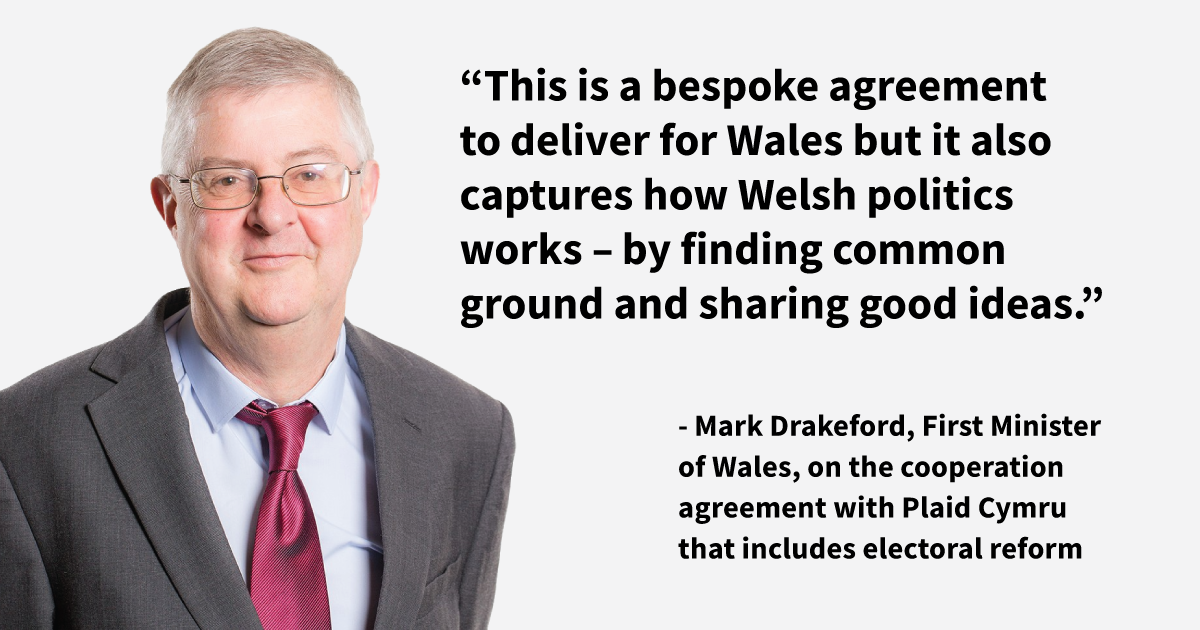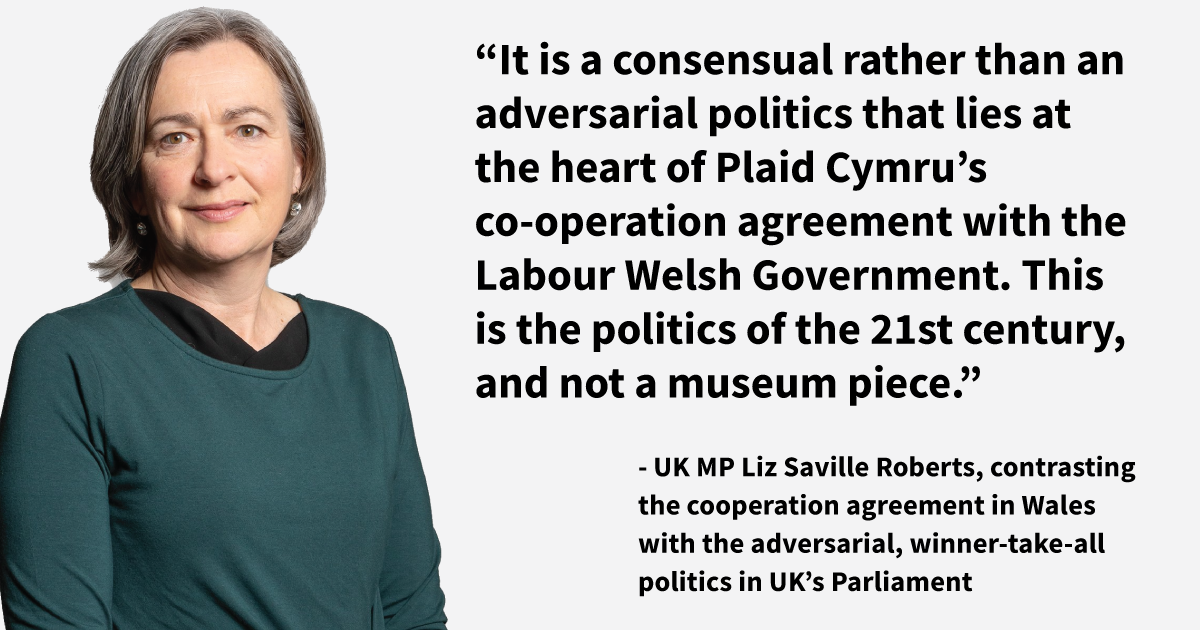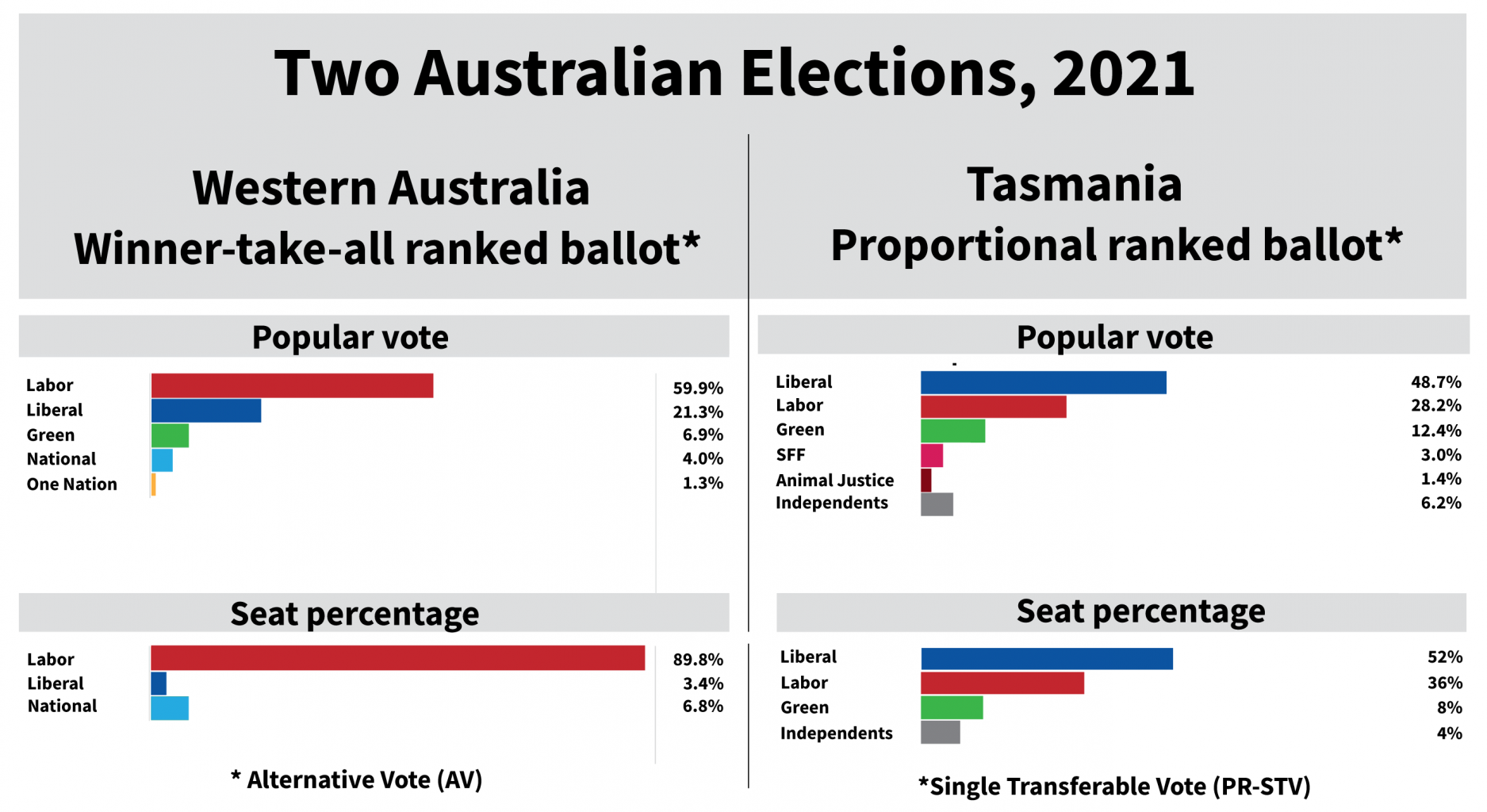
FOR IMMEDIATE RELEASE
Cooperation between parties in Wales for good governance and electoral reform
Welsh Labour and Plaid Cymru have just signed a 3-year cooperation deal which includes a commitment to electoral reform:
“Working together we will:
Support plans to reform the Senedd, based on 80 to 100 Members; a voting system, which is as proportional―or more―than the current one and have gender quotas in law. We will support the work of the Senedd Special Purpose Committee and introduce a Senedd reform Bill 12 to 18 months after it reports.”
First Minister Mark Drakeford, leader of the new minority government, emphasized how the deal will bring more collaborative politics to Wales:
“This is a bespoke agreement to deliver for Wales but it also captures how Welsh politics works―by finding common ground and sharing good ideas.
Plaid Cymru Leader Adam Price noted:
“As Wales faces many challenges from Brexit, the climate emergency and the ongoing pandemic, co-operation has never played such a pivotal part in our democracy.”
Plaid Cymru MP Liz Saville Roberts delivered a biting speech in UK Parliament today, contrasting the “consensual politics” of the cooperation deal in Wales with the winner-take-all, adversarial politics of Westminster:

Over the past five years, calls have grown louder to make the semi-proportional system now used in Wales more proportional—and three parties have been laying the groundwork to make it happen.
The Welsh Liberal Democrats have consistently advocated for a more proportional system, particularly supporting Single Transferable Vote (STV), the proportional system used in Ireland.
In 2017, the independent Expert Panel on Assembly Electoral Reform recommended making the Welsh electoral system more proportional by adopting STV.
In 2020, the Senedd Committee on Electoral Reform, chaired by a Labour Party member, also recommended that Wales make its electoral system more proportional by adopting STV in time for the 2026 election.
Both the Liberal Democrats and Plaid Cymru included STV in their 2021 platforms.
The Labour Party’s platform pledged:
“We will build on the work of the Senedd Committee on electoral reform.”
Improving the electoral system in Wales would require the support of two thirds of the Welsh Assembly members. Labour, Plaid Cymru and the Liberal Democrats together hold 44 of the 60 seats in the Assembly.
These cooperative efforts to make the electoral system more proportional stand in sharp contrast to the divisive, partisan politics of electoral reform in Canada.
Federally, Justin Trudeau rejected the evidence from the 2016 all-party committee on electoral reform (ERRE) when 88% of the experts recommended proportional representation.
Trudeau has made it clear that the only system he will discuss is the Alternative Vote (winner-take-all ranked ballot), even though experts show it could deliver results that are less proportional than first-past-past-the-post, no other party wants it, and it would only benefit the Liberal Party.
In Ontario, Liberal Leader Steven Del Duca is following Trudeau’s lead more aggressively, vowing if elected to force through Alternative Vote in Ontario—or he’ll resign. A recent Leger poll showed that Ontarians strongly oppose one-party decision-making on the voting system.
Many of our politicians, immersed for too long in the cutthroat politics of first-past-the-post, are just not up to the job of designing an electoral system that works for people.
It’s time to put evidence first, and let citizens lead with a Citizens’ Assembly on Electoral Reform, both nationally and in Ontario.
###
Fair Vote Canada is a national citizens’ campaign for proportional representation. We advocate for impartial, independent citizens’ assemblies on electoral reform.
Media contact: [email protected]

BACKGROUND NOTES ON WALES
Wales currently elects its Assembly Members using a semi-proportional Additional Member System. This system is more commonly known in Canada as Mixed Member Proportional (MMP).
MMP can be designed to be very proportional.
However, in Wales, only 20 out of the 60 seats are “compensatory seats” (seats which add proportionality), so the results are seriously skewed. In the 2021 election, for example, the Labour Party won 50% of the seats (30 out of 60) with about 37% of the popular vote.
A 2017 report by the independent Expert Panel on Assembly Electoral Reform recommended that Wales switch to Single Transferable Vote (STV), the proportional electoral system used in Ireland. According to the panel, “STV delivers against our principles of proportionality, equivalent status for Members and voter choice.”
In 2020, the report of the Electoral Reform Committee in Wales chaired by the Labour Party recommended:
Legislation should be introduced early in the Sixth Senedd to provide that Members of the Senedd are elected by the Single Transferable Vote electoral system with effect from the 2026 election.
It is important to distinguish between a proportional system that uses ranked ballots (such as Single Transferable Vote) and a winner-take-all system that uses ranked ballots (the Alternative Vote). Even though they both use a ranked ballot, they have different aims and vastly different outcomes. See an example from Australia in the picture below.

